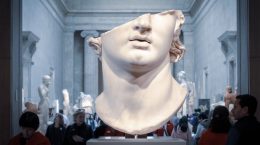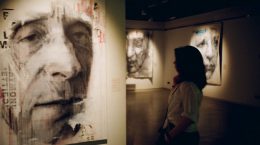All the years of its activity, Our House has not only saved repressed Belarusians, monitored the situation with persecution and cooperated with international organizations. We also tried to participate in many areas, including cultural ones. We created books, held cultural events, covered concerts and wrote about new books. Today we will tell you about how “Our House” took part in the cultural life of Belarus.
During its history, “Our House” has held several festivals. In 2010, “Endorphin” passed in Orsha. On July 9, the Orsha club hosted a concert with the participation of the best bands of Minsk: “Mutnaevoka”, “Garagzkija”, with Pete Pavlov, “Indra”, as well as the group “Vuha”. On July 10, at the open-air venue, festival guests could attend graffiti workshops, get their hair done by hairdressers, watch a soap bubble show and a fire show, get acquainted with an exhibition of paintings. Organizers attracted well-known Belarusian bands and young musicians. The festival took place also in 2011 in Minsk. Performance groups and musical projects took part in it.
We tried to create books, films, and music ourselves. In 2012, one musician wrote a funny song about mutual assistance, support and the joy of communication. He said that he wanted to bring a little delight and positivity to the world: “We are all subject to various emotional attacks, we all have a bad mood. Let this song become for you a “minute pause” in the elusive everyday life.” The presentation of the composition was on the YouTube channel “NASH DOM TV”.
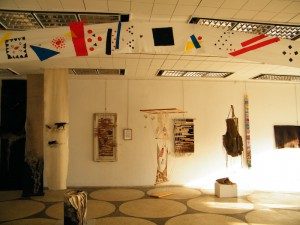 We shared news from interesting cultural events with Belarusians. In 2012, our activist visited the republican art exhibition “Metaphors and Metamorphoses” – the first Belarusian textile Plein air continuation. We showed readers photos of works from linen, plastic, cardboard, plexiglass, polymers, told about the peculiarities of weaving in our country. This exhibition was largely experimental.
We shared news from interesting cultural events with Belarusians. In 2012, our activist visited the republican art exhibition “Metaphors and Metamorphoses” – the first Belarusian textile Plein air continuation. We showed readers photos of works from linen, plastic, cardboard, plexiglass, polymers, told about the peculiarities of weaving in our country. This exhibition was largely experimental.
Unfortunately, the cultural events of the country are not always associated with the discovery of something new.
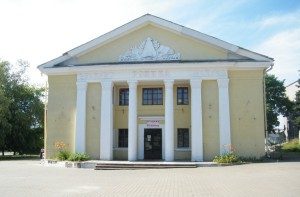 Sometimes, on the contrary, it is necessary to cover the termination of the work of cultural institutions. In 2012, Borisov city authorities decided to sell the “Rodina” cinema building. It appeared in 1958 according to a standard project. In the 1970s, citizens could hardly get tickets for the sessions, but after the collapse of the Soviet Union, the building became useless to anyone. In 2012, Minskoblkinovideoprokat decided to sell Rodina. “Our House” also wrote about this. Interestingly, the cinema was put up for sale several times but did not find a buyer. Only in 2016, the building was purchased for a hotel, but nothing came out of the project. And in 2018, authorities decided to demolish it. Now, the city, where more than 140 thousand people live, has only one cinema – “October”.
Sometimes, on the contrary, it is necessary to cover the termination of the work of cultural institutions. In 2012, Borisov city authorities decided to sell the “Rodina” cinema building. It appeared in 1958 according to a standard project. In the 1970s, citizens could hardly get tickets for the sessions, but after the collapse of the Soviet Union, the building became useless to anyone. In 2012, Minskoblkinovideoprokat decided to sell Rodina. “Our House” also wrote about this. Interestingly, the cinema was put up for sale several times but did not find a buyer. Only in 2016, the building was purchased for a hotel, but nothing came out of the project. And in 2018, authorities decided to demolish it. Now, the city, where more than 140 thousand people live, has only one cinema – “October”.
In 2013, we contributed to the appearance of a monument to the musical group “The King and the Fool” leader, Mikhail Gorshenev, in Minsk. He died of heart failure. His fans initiated petitions in many Russian, Ukrainian, Belarusian cities to establish memorials in his honour. Minsk fans of the band sent an electronic appeal to the city authorities with a proposal to install an appropriate sign in memory of Mikhail Gorshenev. The initiators promised to monitor the order and cleanliness of the memorial sign. The Minsk City Executive Committee allowed installation in Lyakhovsky Square, near the “Viktor Tsoi Wall”.
Presentations of not only songs but also books passed under the auspices of “Our House”. In 2013, journalist Oleg Gruzdilovich presented the book “Who blew up the Minsk metro”. The human rights defender of our organization, Valery Shchukin, wrote about it. He clarified that in his book Oleg Gruzdilovich could not even use photos of those who died in the disaster on April 11, 2011. “The author appealed to the Minsk City Executive Committee with a request to provide photos that were posted at the scene of the tragedy (Oktyabrskaya metro station). The journalist was chased through all the floors of this body of the capital’s power, from one official to another but the authorities didn’t give photos,” the human rights activist said. The pro-government newspaper “SB. Belarus Today” stressed the correctness of the death sentence against Vladislav Kovalev and Dmitry Konovalov. These guys were accused of committing a terrorist attack. But this version is not recognized by the Belarusian opposition.
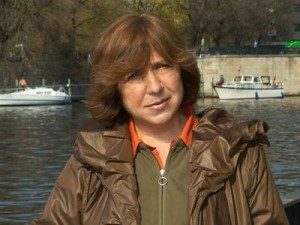 In 2013, we could not ignore the release of a new book by Sviatlana Alexievich, “Second-hand Time”. This book was the last in a series of five works by Alexievich under the general title “The Red Man. Voices of Utopia”. Here, people share their memories of life in the USSR, about what happened after its existence ceased. In it, Sviatlana Alexievich deduced the type of Soviet man – homo soveticus: “Some believe that this is a tragic character, others call him a “scoop”. It seems to me that I know this person, he is well known to me, I have lived next to him, side by side for many years. He is me. These are my acquaintances, friends, parents.” We also wrote about the appearance of the Belarusian version of this book in 2014. And in 2015, of course, we noted that our Belarusian writer became a laureate of the Nobel Prize in Literature.
In 2013, we could not ignore the release of a new book by Sviatlana Alexievich, “Second-hand Time”. This book was the last in a series of five works by Alexievich under the general title “The Red Man. Voices of Utopia”. Here, people share their memories of life in the USSR, about what happened after its existence ceased. In it, Sviatlana Alexievich deduced the type of Soviet man – homo soveticus: “Some believe that this is a tragic character, others call him a “scoop”. It seems to me that I know this person, he is well known to me, I have lived next to him, side by side for many years. He is me. These are my acquaintances, friends, parents.” We also wrote about the appearance of the Belarusian version of this book in 2014. And in 2015, of course, we noted that our Belarusian writer became a laureate of the Nobel Prize in Literature.
We have published books ourselves during all the years of our activity. Our organization’s Google Books account has publications for adults and children, colouring books, jokes, memos and consequential literature. We created an 82-page album, “City of the N-tsk”, filled with photos of Novopolotsk made by young authors. There are stories of prisoners of fascist concentration camps combined into the book “Children of War”, a collection of jokes, an anti-stress colouring book and the book “Good Morning, Belarus”, which is still relevant to this day. A review of our publications in Google Books is available at the link.
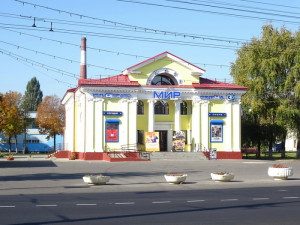 We tried to do everything to make cities and cultural institutions comfortable for Belarusians. In 2014, “Our House” drew attention to the outrage of Homel residents about the toilet at the Mir cinema. A bio-toilet booth stood a few meters from the entrance. During the daytime, visitors made complaints to projectionists about its untimely cleaning and sanitary condition. After cleaning the toilet with a Special Communtrans machine, faeces traces remained on the asphalt from the hose. Activists of “Our House” met with the deputy head of the administration of the Novobelitsky district of Gomel Sergey Korneev and asked the citizens a question about the toilet. Sergey Korneev promised to take this problem under control.
We tried to do everything to make cities and cultural institutions comfortable for Belarusians. In 2014, “Our House” drew attention to the outrage of Homel residents about the toilet at the Mir cinema. A bio-toilet booth stood a few meters from the entrance. During the daytime, visitors made complaints to projectionists about its untimely cleaning and sanitary condition. After cleaning the toilet with a Special Communtrans machine, faeces traces remained on the asphalt from the hose. Activists of “Our House” met with the deputy head of the administration of the Novobelitsky district of Gomel Sergey Korneev and asked the citizens a question about the toilet. Sergey Korneev promised to take this problem under control.
We introduced Belarusians not only to well-known representatives of Belarusian culture. But also we opened names of those whose work is not familiar to a wide range of people. In 2015, “Our House” told about the Brest artist Oksana Nupreychik and her work “The Incomprehensible situation in Belarus”. The girl got inspiration from ordinary people for this picture: “In the picture, I depicted a very vague image of a person. It means that in the modern world, a person is invisible, lost in conditions. Unfortunately, the details are not the best right now. No matter how optimistic you are, it’s true.”
 Belarusian situation was also reflected in the creative activities of “Our House”. In 2019, we organized performances twice. The first of them was in Vilnius on August 28, 2019. We dedicated it to the torture, beatings and murders of civilians by the Belarusian police. The main “mastermind” was Dmitry Polienko, an activist of the anarchist movement, who was repeatedly detained by security forces. In the end, he was charged with particularly malicious hooliganism and sent to prison. In the pre-trial detention centre, he had to endure torture, beatings, punitive psychiatry was used against him. The activists of “Our House” created the art installation of a man without a leg. Through it, we wanted to call on civil initiatives, political parties, social movements and initiatives not to leave the case of Dmitry Polienko without attention.
Belarusian situation was also reflected in the creative activities of “Our House”. In 2019, we organized performances twice. The first of them was in Vilnius on August 28, 2019. We dedicated it to the torture, beatings and murders of civilians by the Belarusian police. The main “mastermind” was Dmitry Polienko, an activist of the anarchist movement, who was repeatedly detained by security forces. In the end, he was charged with particularly malicious hooliganism and sent to prison. In the pre-trial detention centre, he had to endure torture, beatings, punitive psychiatry was used against him. The activists of “Our House” created the art installation of a man without a leg. Through it, we wanted to call on civil initiatives, political parties, social movements and initiatives not to leave the case of Dmitry Polienko without attention.
The second performance was held on August 30, 2019, on the Svisloch River. It was dedicated to solidarity with political prisoners of Belarus. “Our House” prepared it together with the initiative “DISSIDENTBY”. On the river, activists launched boats in support of political prisoners.
Our creative activity did not stop after the 2020 elections. In January 2021, an online concert dedicated to the Lithuanian Freedom Defenders Day passed on the YouTube channel “NASH DOM TV”. We remembered how thirty years ago, the Lithuanians won freedom and independence in a hard struggle. Politicians and cultural figures have united in one stream. Regina Sarkisova, Vladimir Sudnovsky, Margarita Levchuk, Lyavon Volsky, Andrey Makarevich, Ieva Narkute and others looked at the light.
In March 2021, Olga Karach met with the legendary actress Liya Akhedzhakova, director Oksana Mysina, playwright Andrey Kureychik and the actor from the film “Offended. Belarus(siya)”, Anna Sirotina. Andrey Kureychik told about the idea of the play, shared his creative plans. Liya Akhedzhakova and Anna Sirotina expressed their feelings and thoughts after the release of the film Oksana Mysina answered questions about participation in the marches, returning to the topic of Belarus and about the revolution of consciousness.
In July 2021, “Our House” joined the International Week of Belarusian Culture. Videos and photos from cultural events appeared on our social networks. And before the start of the week, we reminded readers about what Belarusian culture has become under Lukashenka: “This is the “Slavyanski Bazar in Vitebsk”, which gathers artists loyal to the illegitimate government, mainly from Belarus and Russia. These are “Dazhynki” imbued with the Soviet cult of bread and grain – however, the holiday has nothing to do with the ancient rite. These are endless events dedicated to the war, songs about a strong leader, a strong country and that “they don’t give away their beloved”. It is a poster of Kupalovsky, consisting of two or three performances. It is an attempt to send a song supposedly from the people with political overtones to Eurovision.”
We are interested in the development of Belarusian culture. We want unique names to discover, new works of art and literature to create. Unfortunately, this is almost impossible under the dictatorship-only those who glorify Lukashenka have the right to exist here. But we hope that we have already managed to put our hand to cultural events in our country, and in the future, we will be able to do even more.


